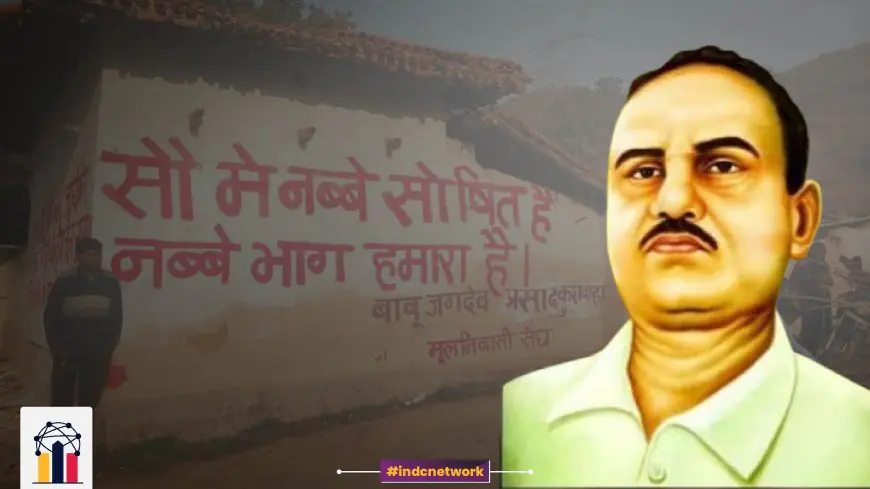Biography of Babu Jagdev Prasad Kushwaha: A Social Revolutionary for the Marginalized
Babu Jagdev Prasad Kushwaha, an Indian social worker, reformist, and political leader, is remembered for his fierce advocacy for the rights of Dalits, backward classes, and other marginalized communities. He dedicated his life to uplifting the oppressed and challenging the deeply entrenched caste system in India. From his humble beginnings in Bihar to becoming a significant political figure, his work left an indelible mark on Indian society. This article delves into his early life, his entry into politics, his ideologies, and the legacy he left behind as a champion for social justice and equality.

INDC Network : Biography : Biography of Babu Jagdev Prasad Kushwaha: A Social Revolutionary for the Marginalized
Introduction : Babu Jagdev Prasad Kushwaha, a revolutionary leader and staunch advocate for the marginalized, played a critical role in shaping the social and political landscape of India, particularly in the fight for Dalit and backward class rights. Born into a society deeply fractured by caste divisions and inequalities, Kushwaha dedicated his life to breaking the chains of caste oppression, creating awareness about the injustices faced by millions, and demanding reform on all fronts. His contribution to Indian society, especially in the state of Bihar, left an everlasting legacy that continues to inspire generations of social reformers and activists.
This article explores the life of Babu Jagdev Prasad Kushwaha in great detail, shedding light on his early years, his journey into politics, the ideologies he championed, and his profound impact on the lives of those who were marginalized and oppressed.
Early Life and Education : Babu Jagdev Prasad was born on February 2, 1922, in Kurtha village, Jehanabad district of Bihar, into a family belonging to the Kushwaha (Koeri) community, which was classified as an Other Backward Class (OBC). His upbringing in a rural environment exposed him to the harsh realities of caste-based discrimination and poverty from an early age. His personal experiences of the societal injustices rooted in the rigid caste hierarchy deeply influenced his worldview and shaped his future activism.
Despite the economic hardships, Jagdev Prasad was a bright and determined student. He completed his early education in his village and later attended Patna University, where he obtained a degree in Economics and Political Science. His exposure to the ideas of social reformers and freedom fighters during his university years sparked his interest in politics and social justice. He was particularly influenced by the ideologies of Jyotirao Phule, Periyar E.V. Ramasamy, Dr. B.R. Ambedkar, and other reformists who fought against the caste system and championed the rights of the downtrodden.
Political Journey and Rise as a Social Leader : Jagdev Prasad's political career began in the aftermath of India’s independence, a period that saw significant social and political upheaval. While India had rid itself of British colonialism, the deep-seated caste discrimination and inequalities persisted, and the promises of democracy and social justice remained unfulfilled for many marginalized communities. Realizing that the political system was failing to address the concerns of the backward classes, Jagdev Prasad sought to use his education and leadership skills to change the system from within.
He started his political journey by joining the Socialist Party of India, where he found a platform to raise issues related to social equality, economic justice, and land reforms. However, as he began to work closely with the party, he felt that the political mainstream was not adequately addressing the concerns of the Dalits, OBCs, and other marginalized groups. This prompted him to chart his own course in Indian politics.
In the 1960s, Babu Jagdev Prasad founded the Shoshit Dal (Exploited Class Party), a political party focused on addressing the issues of the oppressed and downtrodden sections of society. His party aimed to bring together Dalits, backward classes, and other marginalized communities to create a united front against caste oppression and socio-economic exploitation. Under his leadership, the Shoshit Dal sought to dismantle the hierarchical structures of society and redistribute power and resources more equitably.
Ideology and Philosophy : Babu Jagdev Prasad was a staunch critic of the caste system and feudalism, which he believed were the primary sources of inequality and exploitation in Indian society. His political philosophy was centered around the principles of social justice, equality, and human dignity. Drawing inspiration from the ideologies of socialism, he advocated for the redistribution of wealth and resources, land reforms, and the upliftment of the working class.
His slogan "Pichhda Pave Sau Mein Sattar, Tab Banega Hindustan Majboot" (When seventy out of hundred are represented, only then will India become strong) became a rallying cry for his movement, encapsulating his belief that India could only progress as a nation if the majority of its population, which comprised the backward classes and Dalits, were empowered.
Jagdev Prasad was also deeply influenced by Dr. B.R. Ambedkar’s vision of annihilating the caste system. Like Ambedkar, he believed that social reforms were as crucial as political reforms and that merely granting political rights would not suffice unless accompanied by social and economic emancipation. He called for radical reforms in the education system to make it more inclusive and accessible to marginalized communities. He also pushed for the abolition of zamindari (landlordism) and advocated for land redistribution to benefit landless farmers.
Social Reforms and Advocacy for the Marginalized : One of Babu Jagdev Prasad’s most significant contributions was his tireless work toward uplifting the backward classes, particularly in Bihar. He consistently campaigned for affirmative action policies, such as reservations in government jobs and educational institutions, to provide better opportunities for Dalits, OBCs, and marginalized groups. He believed that education was the most potent tool for breaking the cycle of poverty and oppression, and he worked to improve the access to and quality of education for the lower castes.
Jagdev Prasad was also an advocate for labor rights, particularly for agricultural laborers and landless peasants who were often exploited by feudal landlords. He called for fair wages, land reforms, and the rights of peasants to own the land they tilled. His efforts were instrumental in sparking land reform movements in Bihar and other parts of northern India, challenging the entrenched feudal structures that kept the lower castes in perpetual poverty.
As a social reformer, Babu Jagdev Prasad was not afraid to confront the upper caste-dominated power structures that sought to maintain the status quo. His speeches often denounced the upper caste elites for perpetuating inequality and resisting reforms. His defiance of these structures earned him both admiration from the oppressed and hostility from the powerful.
Opposition and Challenges : Throughout his life, Jagdev Prasad faced significant opposition from both political adversaries and the entrenched upper-caste elite. His radical ideas and confrontational approach often put him at odds with the ruling class. In a country where caste-based oppression was deeply rooted, his calls for land redistribution and empowerment of the backward classes were seen as a direct threat to the existing social order.
The landlords, particularly in Bihar, viewed his advocacy for land reforms as a challenge to their economic and political dominance. As a result, Jagdev Prasad and his followers were often subjected to violence and intimidation. Despite these challenges, he remained steadfast in his commitment to his cause and continued to mobilize support from the grassroots.
Assassination and Martyrdom : Babu Jagdev Prasad's life was tragically cut short on September 5, 1974, when he was assassinated during a protest in Kurtha, his birthplace. The protest was organized to demand justice for the poor and marginalized communities, and Prasad was leading a peaceful march when the police opened fire. His death sent shockwaves through Bihar and the rest of the country, sparking outrage among his supporters and the backward classes. He became a martyr for the cause of social justice, and his death further galvanized the movement he had worked so hard to build.
Despite his untimely death, the legacy of Babu Jagdev Prasad Kushwaha lived on. His ideals and vision continued to inspire social movements, particularly those advocating for Dalit and backward class rights. He is remembered as a courageous leader who fearlessly fought against injustice and devoted his life to creating a more equal and just society.
Legacy and Impact on Indian Society : Babu Jagdev Prasad’s influence on Indian society, particularly in Bihar, remains profound. His work laid the foundation for future political movements that sought to uplift the marginalized and oppressed. The rise of backward class and Dalit leaders in Indian politics, particularly in states like Bihar and Uttar Pradesh, can be traced back to the pioneering efforts of leaders like Jagdev Prasad.
His advocacy for reservations in government jobs and educational institutions contributed significantly to the shaping of India's affirmative action policies. Today, many of the rights and opportunities available to backward classes and Dalits owe a debt to the tireless work of social reformers like Jagdev Prasad.
Several political leaders who have emerged from backward classes in modern Indian politics, such as Lalu Prasad Yadav and Nitish Kumar, have acknowledged the influence of Jagdev Prasad's ideas on their own political ideologies. His emphasis on empowering the oppressed through education, economic reform, and political representation continues to resonate in contemporary debates about social justice and equality in India.
In addition to his political legacy, Babu Jagdev Prasad remains a symbol of resistance against oppression and a beacon of hope for those fighting against the injustices of the caste system. His life and work serve as a reminder of the power of collective action and the importance of challenging entrenched power structures to bring about meaningful change.
Conclusion : Babu Jagdev Prasad Kushwaha was not just a political leader; he was a social revolutionary who dedicated his life to fighting for the rights of the oppressed and marginalized. His unwavering commitment to the cause of social justice, his defiance of caste-based oppression, and his vision for a more equal society continue to inspire generations of activists and leaders. As India continues to grapple with issues of caste discrimination and inequality, the life and legacy of Babu Jagdev Prasad remain more relevant than ever.
His martyrdom solidified his place in history as a champion for the downtrodden, and his ideals continue to guide the ongoing struggle for equality, dignity, and justice for all sections of society.
What's Your Reaction?









































































































































































